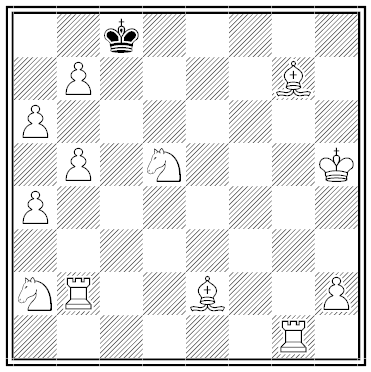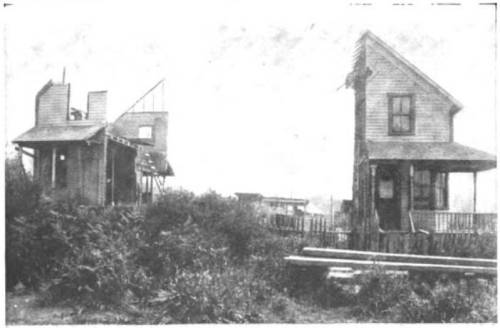Write out the numbers ONE through NINE and alphabetize them.
ONE appears in the center.
Do the same for ONE through NINETEEN and ONE through NINETY-NINE.
In each case, ONE remains in the center.
(Discovered by Edward Wolpow.)
Write out the numbers ONE through NINE and alphabetize them.
ONE appears in the center.
Do the same for ONE through NINETEEN and ONE through NINETY-NINE.
In each case, ONE remains in the center.
(Discovered by Edward Wolpow.)
What constitutes a name? In 1976, North Dakota short-order cook Michael Dengler sued for the right to change his name to 1069. He said that each digit reflected an aspect of his identity; 6, for example, symbolized his “relationship with the universe in my understanding of my spatial occupancy through this life.” He insisted that “the only way that this identity can be expressed is 1069.”
The state supreme court wrestled with the implications:
If the proposed change is written or printed it would simply appear in Arabic symbols, 1069; but if it is verbalized would it be ‘one thousand sixty-nine,’ ‘one naught six nine,’ ‘one zero six nine,’ or would it be ‘ten sixty-nine’? Petitioner, during the oral argument, stated how he would verbalize it, but this would not eliminate the problem because other persons will not know this.
Some observers joked that he could go by “Juan.” But in the end the court refused the request altogether. “Innovative ideas, even though bordering on the bizarre, are frequently encouraged and may be protected by the law and the courts, but to use the court or law to impose or force a number in lieu of a name upon society is another matter.”
Suppose there were an experience machine that would give you any experience you desired. Superduper neuropsychologists could stimulate your brain so that you would think and feel you were writing a great novel, or making a friend, or reading an interesting book. All the time you would be floating in a tank, with electrodes attached to your brain. Should you plug into this machine for life, preprogramming your life’s experiences? If you are worried about missing out on desirable experiences, we can suppose that business enterprises have researched thoroughly the lives of many others. You can pick and choose from their large library or smorgasbord of such experiences, selecting your life’s experiences for, say, the next two years. After two years have passed, you will have ten minutes or ten hours out of the tank, to select the experiences of your next two years. Of course, while in the tank you won’t know that you’re there; you’ll think it’s all actually happening. … Would you plug in?
— Robert Nozick, Anarchy, State, and Utopia, 1974
quadragesimarian
n. one who observes Lent

Harry L. Nelson offered this puzzle in the Journal of Recreational Mathematics in 1983. The black king’s favorite square is c8, but he finds it is under attack by a white pawn. In how few moves can he correct this problem and return to a peaceful c8? White never moves. The black king can capture white pieces, but he may not visit any square more than once and may not enter check.
Apparently bored in 1940, Gerald Tyrwhitt-Wilson sent a note to socialite Sibyl Colefax:
I wonder if by any chance you are free to dine tomorrow night? It is only a tiny party for Winston and GBS. I think it important they should get together at this moment. There will be nobody else except for Toscanini and myself. Do please try and forgive this terribly short notice. Eight o’clock and — of course — any old clothes.
“There was only one thing wrong about this heaven-sent epistle, which was written in longhand,” wrote Beverley Nichols. “The address and the signature were totally illegible. The address looked faintly like Berkeley Square, but it might equally have been Belgrave Square and the number might have been anything from 11 to 101. As for the signature she could not tell whether it was male or female.”
Lady Colefax called everyone she knew, but she never found the source. “There is something almost heroic in the thought of her small, thin, determined figure, sitting in her drawing-room in a hail of bombs, reaching out so desperately for the next rung of the social ladder that, for her, reached to heaven.”
10102323454577 is the smallest 14-digit prime number that follows the rhyme scheme of a Shakespearean sonnet (ababcdcdefefgg).
(Discovered by Jud McCranie.)

Vito and Giuseppe Bertucci, father and son, living at 3,103, South Twelfth Street, Tacoma, Washington, were equal owners of their house. The son was married. A short time ago the house caught fire and, as a result, became in need of repairs. But here a hitch arose. Father and son could not agree upon just what should be done. They wrangled and wrangled over the matter, and this only led to further misunderstandings, neither would the one buy the other out. There was absolutely no possibility of adjustment of the differences between them, so they did the only wild thing possible — they agreed to each pay their share for the hire of a carpenter who should cut the house in two. The father owns the part on the right of the picture, while the son has already moved his to one side, and will make this the nucleus for another home. The transaction is naturally the laughing affair of Tacoma, and the odd buildings can easily be seen from one of the street cars.
— Strand, November 1906
A U.S. serviceman’s chance of death in battle, per Nicholas Hobbes’ Essential Militaria (2003):
William Buckland awoke one night and told his wife, “My dear, I believe that Cheirotherium‘s footsteps are undoubtedly testudinal.” They induced a garden tortoise to walk through a paste of flour, and the impression it left matched the fossil footprint.
On summiting the Finsteraarhorn in 1845, M. Dollfus-Ausset cried, “The soul communes in the infinite with those icy peaks which seem to have their roots in the bowels of eternity!”
In 1919 Cecilia Payne bicycled to the Cambridge Solar Physics Observatory, found a man repairing the roof, and said, “I have come to ask why the Stark effect is not observed in stellar spectra.” He was E.A. Milne, and he didn’t know. “Later he became a good friend and a great inspiration to me.”